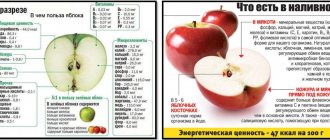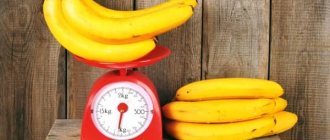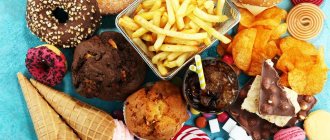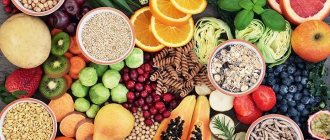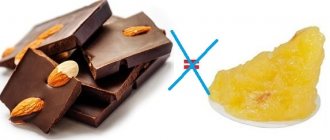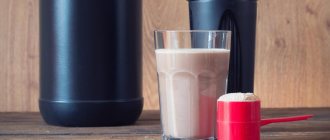"Fast" and "slow" carbohydrates
All carbohydrates contained in food are divided into fast (simple) - with a high glycemic index, and slow (complex) - with a low glycemic index.
When planning a diet for weight loss or for gaining lean muscle mass, it is important to look not only at the ratio of proteins, fats and carbohydrates, but also what types of carbohydrates to give preference to (simple or complex) and what foods contain them.
Carbohydrates are the main source of energy for the human body and are found mainly in foods of plant origin. The calorie content of foods containing large amounts of carbohydrates is quite high - 1 g of carbohydrates contains 4 kcal. The average carbohydrate intake is 4g per 1kg of body weight per day.
A person who spends a lot of energy every day (athlete, manual worker) will consume more than 4g of carbohydrates per 1 kg of weight. On the contrary, those who are losing weight need to reduce the norm to approximately 2g/kg (depending on height, weight, physical activity).
For how many carbohydrates are contained in specific food products, see the Calorie Contents and Food Composition Table.
Dry oat flakes
| Name | Quantity |
| Number of calories | 366 kcal |
| Carbohydrates | 69.3 g |
| Squirrels | 11.9 g |
| Fats | 7.2 g |
It may seem that the product is quite high in calories, but in fact this is not the case. Thanks to the addition of water or milk, boiled oatmeal contains significantly fewer carbohydrates, which is why experts from all over the world unanimously recommend this dish to diabetics.
What types of carbohydrates are there?
Simple carbohydrates
Fast (or simple) carbohydrates quickly enter the bloodstream and are immediately used as energy; they are also called easily digestible. They sharply raise blood sugar levels. Fast carbohydrates are found in all food products to which sugar is added - chocolate, baked goods (including white bread), sweets, sweet drinks, etc.; in all fruits (especially bananas and grapes, less so in apples, citrus fruits) and juices from them (both natural and with added sugar); in products made from processed grains (flour products) - pasta (except those made from durum wheat), baked goods (cookies, white bread, rolls, pies, muffins, etc.).
Simple carbohydrates have a high glycemic index (GI).
The glycemic index shows the degree of initial increase in blood sugar when eating food. In response to a spike in sugar, the body releases a hormone - insulin, which transports glucose into the blood. The more sugar, the higher the release of insulin.
If you abuse foods with a high GI for a long time, you will develop a constant feeling of hunger and, as a result, weight will increase. The mechanism is like this:
- the body gets used to high insulin production and there will be a lot of it, even when a person eats food with a low glycemic index
- insulin quickly transfers sugar from the blood and immediately the feeling of hunger appears again (since there is no glucose left in the blood available to obtain energy for current consumption)
- as a result, a person begins to consume more food than necessary, which leads to weight gain if daily calorie expenditure (due to physical activity) has not increased.
If you need energy “here and now” (in the morning or half an hour before training), fast carbohydrates with a high GI are necessary - they will be spent on the current needs of the body and will not have time to go into fat reserves. At the same time, give preference to fruits and chocolate with a high cocoa content (more than 60%), rather than high-calorie sweets and baked goods (which are best avoided completely).
Complex carbohydrates
Slow (or complex, complex) - carbohydrates are absorbed slowly and do not cause sudden spikes in sugar.
They are also called "long". Slow carbohydrates are found in vegetables, unprocessed cereals (unground, less refined) - brown rice, buckwheat, legumes, rolled oats (not instant!), durum wheat pasta, as well as products containing a large amount of fiber (fiber), since it slows down the digestion process and reduces the amount of glucose entering the blood at the same time. Complex carbohydrates have a low glycemic index and do not provoke high insulin secretion. Sugar enters the blood gradually and provides the body with energy longer than simple carbohydrates. Thus, a person does not feel hungry for a long time and does not consume more food than necessary.
Harmful properties of banana
Despite the many positive properties of exotic fruits, there are still some negative aspects . This is due to long-term transportation, because they do not grow here. Usually the fruits are picked green and ripen along the way. However, among the suppliers there are dishonest companies that subject fruit to gas treatment. This allows them to be stored for a longer period. With this processing, all healthy carbohydrates are converted into sugar, which is harmful to health.
Such fruits stimulate appetite, so after eating them it is better to monitor your impulses to have an extra snack. It is best to treat the fruit as a dessert and eat a little after meals.
Bananas increase blood viscosity , which is dangerous for people with varicose veins and thrombophlebitis. They can cause erection problems in men. But for those who have poor blood clotting, such fruits will be a real salvation.
Fruits can cause fermentation in the digestive organs. If you have flatulence, it is better to avoid them. You should also use them carefully if you have gastritis and stomach ulcers, so as not to aggravate the problem.
The fruit has many advantages, however, it should be consumed in moderation and then it will definitely benefit the body.
What time of day should you consume carbohydrates for weight loss and muscle gain?
Use slow carbohydrates when you need to satisfy your hunger for a long time, but at the same time physical activity will be at an average level - for breakfast (along with simple carbohydrates, which will immediately fill the energy deficit after sleep), lunch and dinner.
Before training (at least one hour) – simple and complex carbohydrates. For energy (the complex ones alone will not have time to be digested so quickly and provide energy for training).
If you are training to lose weight (fat burning), then in any case you need to consume less energy per day than you get from food. This means that you will give the body less energy than it needs, stimulating the breakdown of fat in order to replenish the lack of energy. In this case, reduce the total amount of carbohydrates, in particular for dinner - since the lack of energy during sleep is easier to bear than during wakefulness. A common mistake is to satisfy your hunger with fruit in the evening. If you count calories and this snack fits into your daily intake, then there will be no weight gain. But, if you are engaged in fitness, it is wiser to spend these calories on protein foods, which will be needed at night for recovery and muscle gain, and transfer fruits (fast carbohydrates) to breakfast and the time before training (when the body needs energy).
Carbohydrate diet for a week
The weekly diet includes the same products and provides three meals a day. However, if it is difficult for you to maintain long periods of time between meals, you can divide breakfast and lunch into two parts and give yourself snacks.
Day 1: egg and salad with spinach and tomato; vegetable stew, sliced green vegetables with butter; grilled chicken and salad with herbs.
2nd day: omelette, grapefruit; oven-baked meat with green beans; braised cabbage.
Day 3: yogurt with whole grain bread; lentil soup; meat stewed with mushrooms, leafy greens.
4th day: sandwich of rye bread and cheese; a piece of baked fish, a portion of brown rice; squid salad.
5th day: cottage cheese with dried fruits or nuts; steamed pollock and tomato juice; zucchini stewed with garlic.
6th day: tomatoes, 2 eggs; pea soup with croutons; stew with meat, green vegetable mix.
7th day: cottage cheese and apple; cabbage salad, boiled potatoes; fish stewed with vegetables.
Slow
Good or slow carbohydrates are foods with a low glycemic index. Characteristics of this energy group:
- presence of vitamins, fiber and minerals
- chemical structure that speeds up metabolism
- prolonged digestion
- slow release of calories
The good ones, also known as complex compounds, are found in whole grains, unprocessed rice, cereals, nuts, seeds, vegetables and fruits.
Is it right to give up carbohydrate-containing foods?
Sometimes, people, in pursuit of good shape, decide to avoid eating any carbohydrates. But, this is a bad choice.
- Low-energy nutrition is of the ketogenic type. A lack of energy substances in the diet leads to the process of ketosis - fat burning, during which ketone substances enter the blood. These are toxins, in particular, depressing brain functions.
- In addition, the body increases the production of hormones - norepinephrine, adrenaline and glucagon. These compounds are useful in the short term, but on an ongoing basis lead to exhaustion of the body and endocrine disruption.
- Another unpleasant aspect of a low-carbohydrate diet is hypercholesterolemia with rapid vascular damage and the risk of conditions such as stroke or heart attack.
- Just 3-4 months of eating without plant fiber will cause gastrointestinal problems - vomiting, constipation or nausea. Additionally, a deficiency of vitamins B, C and A will form, the body will become acidic, the nervous system will become hyperactive, and the urinary system will react with gout.
- Separately, disorders of calcium phosphate, hemoglobin and glucose metabolism may develop. That is, a person will become acquainted with type 2 diabetes, osteoporosis or osteopenia.
Therefore, the right choice would be a healthy diet rich in slow carbohydrates.
Use in folk medicine
Bananas occupy a special place in the dietary menu. With their help, you can correct gastrointestinal disorders. Particularly constipation. This sweet remedy is especially good for children. The fruits can also be beneficial for:
- liver pathologies;
- inflammatory processes in the kidneys;
- high blood pressure;
- heart problems;
- diseases of the oral cavity;
- some internal bleeding;
- ulcerative pathologies of the gastrointestinal tract;
- enteritis;
- in other cases.
Juice from the fruit is effective against bleeding in the stomach and duodenum, and from the stems of the plant it will help against dysentery and cholera, as well as against hysteria and epilepsy.
The fruit is used for the prevention and treatment of many diseases. After all, it contains a lot of useful substances that have not only nutritional properties, but also healing ones:
- protein (1.5%);
- natural sugars (up to 25%);
- enzymes;
- vitamins (C, B2, PP, E, provitamin A);
- starch;
- malic acid;
- mineral salts, such as potassium;
- bioactive elements (norpinephrine, serotonin, dopamine, catecholamine).
We recommend: Determination of antibodies to pancreatic beta cells, what are they?
This composition allows the fruits to be used in the treatment of many pathologies. They are more effective in preventing deterioration in health.
Recipe 1
The cause of a heart attack is a critical level of magnesium in the body. For those who receive at least 0.5 g of this element daily with food, the risk of disease is reduced to a minimum. This is exactly the amount of magnesium found in one banana.
The fruit is quite filling, and the energy boost it gives lasts until lunch. It takes time to get used to such a “meager” breakfast. In summer it can be replaced with other fruits.
Recipe 2
For edema, traditional medicine regularly recommends banana-milk days. You need to eat one fruit and drink a cup of warm boiled milk at one time, but this should be done several times throughout the day. It’s even better if you have a blender at home: you can use it to make a cocktail from these two ingredients. It tastes much better. And the difficult days of self-restraint will pass easier.
Attention! With the help of these gifts of nature you can fight depression. And all because they contain the “drug of happiness” mescaline
When and how to consume carbohydrate-containing foods?
There are general rules for consuming energy products.
In the morning
You can use small amounts of fast carbohydrates, which will help your brain work intensively and will be a good way to start the day energetically. In the morning it is recommended:
- jam, marmalade or honey
- sweetened yoghurts
- cereal with dried fruits
And also, carbohydrates in porridges - semolina, millet, oatmeal with the addition of fruit.
Must include complex carbohydrates:
- whole grain bread
- durum wheat pastes
- dark pasta and brown rice
In addition, fruits or vegetables in salads, side dishes and fresh.
Evening
Starting from 18-19 hours, it is recommended to eat only protein foods with the addition of lettuce or vegetables, except potatoes and legumes.
Depending on daily activity, when an energetic period is replaced by a measured period, it is necessary to reduce the amount of carbohydrates in the diet.
Glycemic index GI
GI is an indicator that demonstrates how quickly a particular product can increase blood glucose levels. Of course, who can compete in this with glucose itself, which is why its GI is taken to be 100 units. But it turns out that the same dates have a GI of 146.
The table is built in descending order of GI. The fastest carbohydrates in it occupy the first positions.
| The product's name | Glycemic index | Carbohydrate content per 100 grams |
| Dates | 146 | 72 |
| White bread | 136 | 53 |
| Beer | 115 | 8 |
| Baking, desserts | 103 | 70 |
| Sweet drinks | 102 | 12 |
| Sugar | 100 | 100 |
| Fried potato | 95 | 27 |
| Rice | 90 | 76 |
| Honey | 90 | 80 |
| Dried apricots | 65 | 66 |
| Grape | 64 | 17 |
| Boiled potatoes | 63 | 16 |
| Bananas | 60 | 23 |
| Sweet yoghurt | 57 | 9 |
| Mango | 55 | 14 |
Why is sugar dangerous?
If we can say about slow carbohydrates that these are natural fruits and whole grains, then among fast carbohydrates the most useless carbohydrate is sugar. The product has no nutritional value and is considered the drug of the century for a number of reasons.
- Stimulates the formation of beta-endorphins.
- Gives the illusion of stress relief, briefly improving mood.
- It produces biochemical dependence in people.
- It affects the brain in a way similar to opioid intoxication because it stimulates the same receptors that respond to morphine, heroin and codeine.
After eating sweets, people feel calm. They quickly get used to the cake = happiness scheme. As a result, they become dependent.
Excess sugar, as the most prominent representative of bad carbohydrates, leads to:
- hypertension, irritability, hyperactivity
- decreased mental functions, cancer pathology
- suppression of the immune system, accelerated aging
- slowing down recovery processes
Not everyone consciously chooses to abuse simple carbohydrates. Therefore, it is useful to know where sugar is hidden in hidden form.


